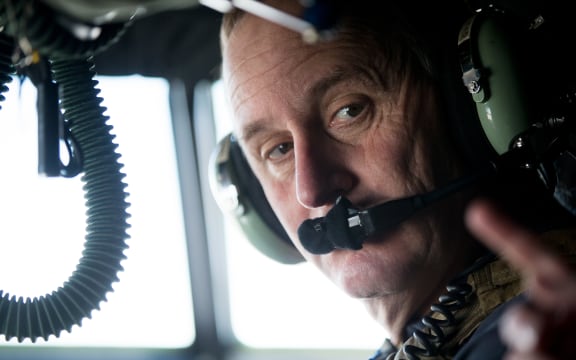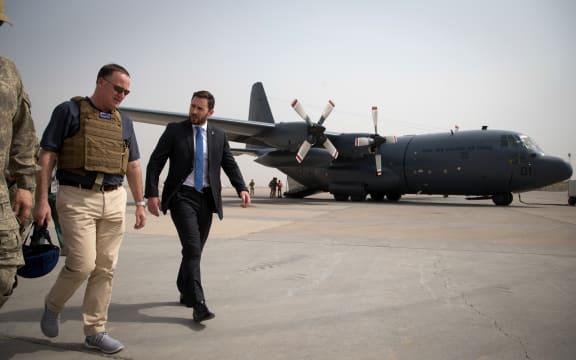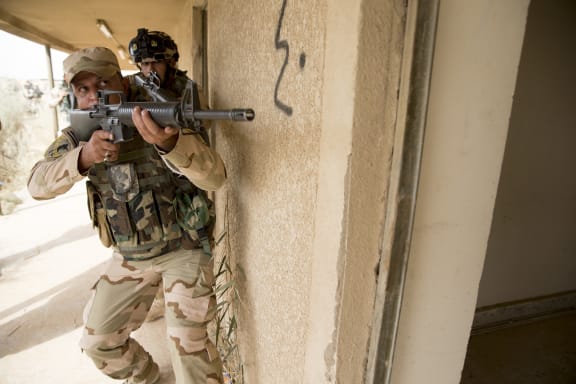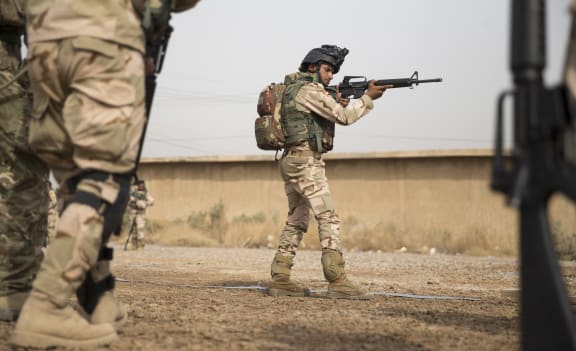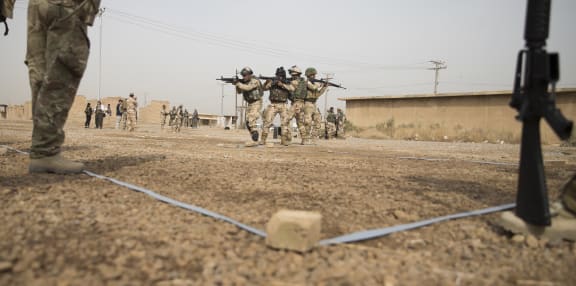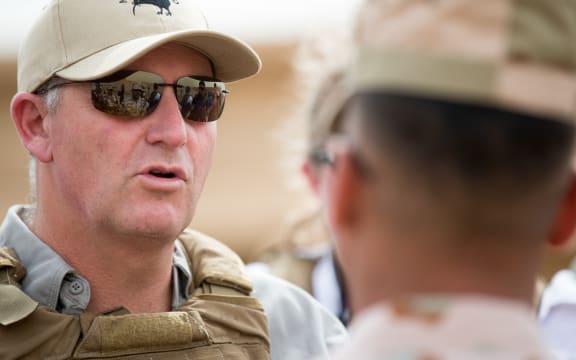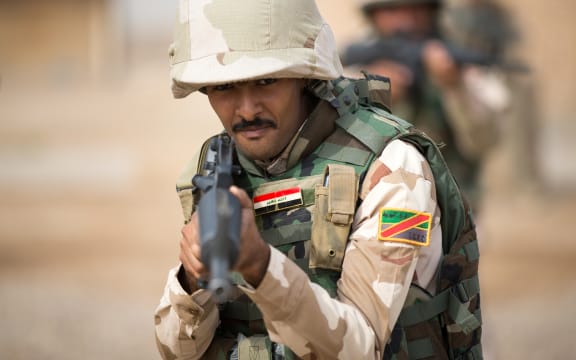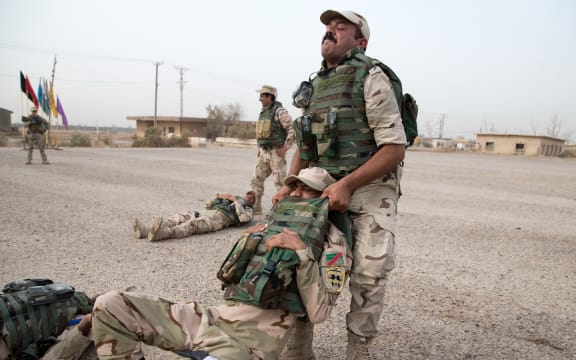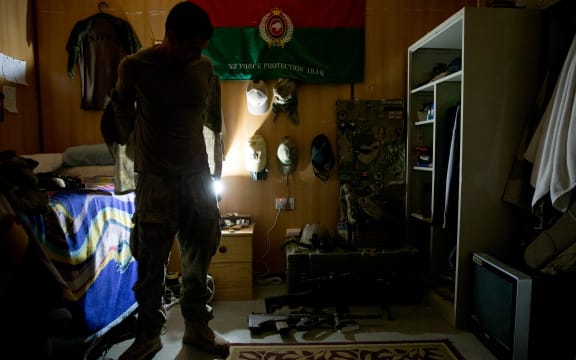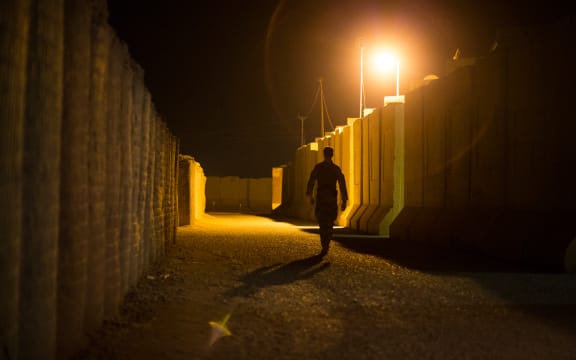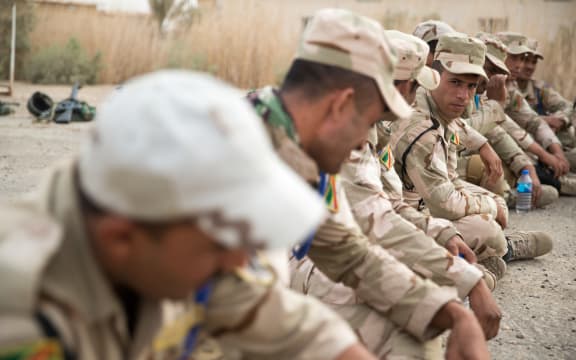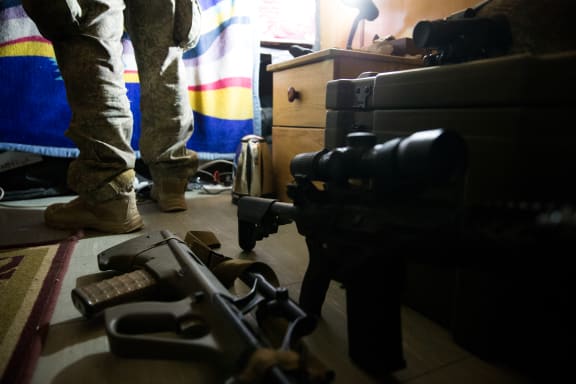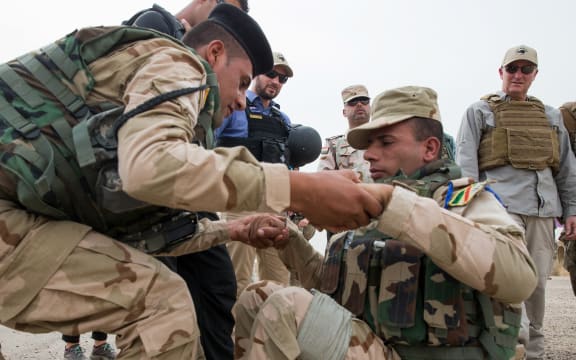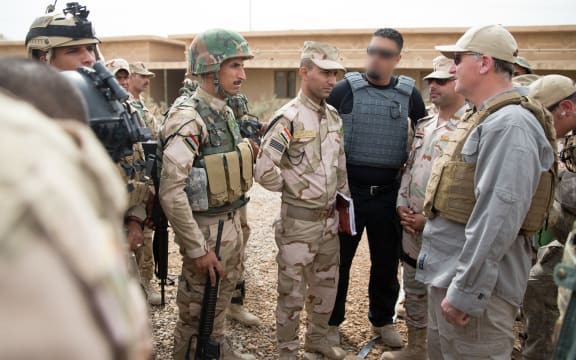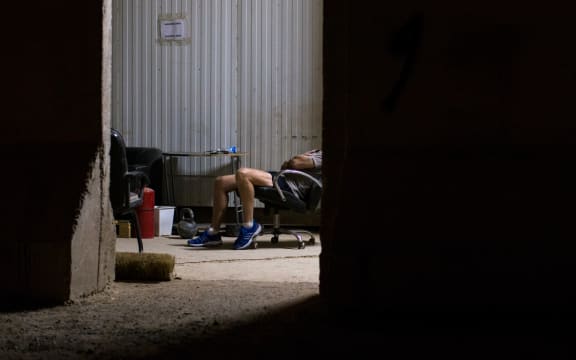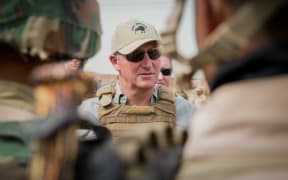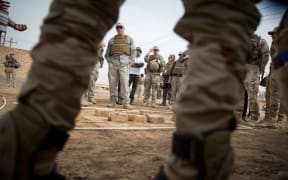On the ground with the New Zealanders providing training at Camp Taji, Radio New Zealand listens to the Iraqi soldier talking it up when it comes to their fight against Islamic State.
"We believe ISIS is like a doll, a baby doll, so we could break it and smash it too easy..." they say.
They sometimes refer to their enemy as Daesh (death cult). Whatever the name, there is no doubt they have a huge challenge on their hands.
About 140 New Zealand troops are in Iraq, most of them at the coalition camp near the capital, Baghdad, training hundreds of Iraqi Security Force soldiers in basic combat and urban warfare.
It is a huge, barren compound that was a United State base during the Iraq War that started with the U.S. led invasion 2003 - it is littered with derelict buildings perfect for the urban combat training.
During a visit by New Zealand Prime Minister John Key to Taji Camp this week, Radio New Zealand News spoke to several of the New Zealand trainers, who cannot be named under Defence Force policy, and the soldiers they are training, who were happy to be identified.
View a gallery of the PM's visit here
The Iraq Security Force soldiers, or ISF, only have about six to eight weeks training, so the drills are focused on what they're likely to need when they go back into field - dealing with improvised explosive devices (IEDs), first aid and close-quarter urban combat.
Many of the Iraqi soldiers are young and inexperienced, but one New Zealand trainer says many have already been in active battle against Daesh.
"One thing that gets us is when they come in for training and we ask them what they've already done, some of the stories are pretty outrageous, so they'll show us their bullet wounds from where they've been shot - like one guy who'd been shot and his mate carried him a kilometre to get him to safety and swum across a river, things like that.
"We asked them to put their hands up who's been involved in an IED [improvised explosive device] and the whole class puts their hands up."
He says they have to make the most of the time they have with the trainees.
"They know what's out there, and they've seen it and a lot of them have lost a lot of friends already, so when they come in here they want to know the good stuff, they don't want to muck around doing drill or anything like that.
"They want to know how to defeat IEDs, they want to know how to put tourniquets on properly, and often they're the ones sucking the information out of us."
'We believe we could do it'
Rafeed Ali Audaa is a Warrant Officer in the ISF.
Asked why he was fighting against Daesh, he says: "They took our lands and they kill our families, kill our friends, so therefore we need to take over all those lines that have been controlled by Daesh and get it free and return it back to our people."
He says their training at Camp Taji will help the ISF in their battle against Daesh.
"With the help and the assistance from the New Zealanders, we believe we could do it."
Private Marwan Razaq, 25, was a computer science student, before he joined the ISF just over a year ago.
Like others, he says he is fighting for his country, his family, Iraq's holy places and because Daesh pretend to be Muslim, when they are not.
"And the reason why I went to protect my country and we received a kind of like a call from the religious leader, they say all the youth people need to go and join the Iraqi Army."
Another key aspect of the training programme is that each trainee is given a full uniform, body armour and new M16 rifle, funded by the U.S.
Captain Hashim is the second-in-command of the 2nd Battalion in the brigade currently being trained.
He says the new equipment helps soldier morale, as does the training.
"Because it's your team, one team, and I notice my soldiers before training, and since the training with the M16, before they had the weapon, but now when [you] come to training with them, they have an M16 - it's very, very nice."
When Mr Key announced the deployment at the start of the year, much of the debate was focused on the level of risk for the defence force personnel.
The New Zealanders work in a compound within a compound that is 36 square metres. They are surrounded by force protection, like other regular force soldiers, at all times.
Outside Camp Taji, ISF soldiers trained by New Zealanders or Australian patrol the surrounding area and operate checkpoints.
However, all trainers say they were mindful of the risk of 'green on blue attacks', or when trainees turn on their trainers.
One New Zealander says they deliberately build up the training, so riskier drills, for example live firing, are only done when they are confident it is safe to do so.
"We take it right back to a basic level so everything is done step by step, just like we'd do at home, especially when they're introduced to a new weapons system so they learn all the dry drills first, we'll keep training them 'til we're happy with the standard, so they won't do anything live until we're all happy."
And he says he feels quite safe training the Iraqis, or jundi.
"Force protection are doing an excellent job, you can see them, and the soldiers as well, the jundi, I feel very comfortable around them."
"There's always going to be a concern but once we establish a rapport, with the soldiers we're working with, you can never be too careful but it's good, it's good working with them."
'We don't want to be here in Iraq forever'
After watching the training and talking to some of the New Zealanders and the trainees, Mr Key says he feels even more convinced that sending the troops to Iraq was the right thing to do.
But he says despite his belief it is making a significant difference, he still has no intention of extending the deployment past its two-year deadline.
"I think we have come here to try and make a real difference but to recognise actually - you know, we're a small country, we have a limited amount of resources, we've got people who've done a tremendous job over the last five or six months, they've had to build out the capability here, the physical infrastructure, you can see how harsh it is."
"I mean, frankly, it's a bit of a rubbish tip down the road, in bits of it and you know our people have had to work very hard to put together tremendous systems, actually everything from logistics to the medical team, but you know, we don't want to be here in Iraq forever."
"I think New Zealand's got a job to do here, we're doing it, and yeah, I think there should be an exit point and that exit point at two years feels about right to me."

